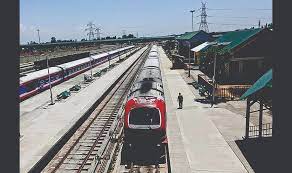The major development in the railway sector is the completion of the survey for the Bilaspur-Manali-Leh railway line, which spans 489 kilometres. The detailed project report for this project is ready, and necessary actions will follow. This project aims to reshape the connectivity of the region and is expected to have a significant impact on transportation in the area.
Train connectivity is essential for the Ladakh region for several reasons, as it brings numerous benefits that positively impact its economic, social, and infrastructural landscape. It offers a reliable and efficient mode of transportation, linking Ladakh to other parts of the country and allowing people and goods to move in and out of the region more easily, facilitating trade, tourism, and overall connectivity with the rest of India. Railway connectivity via Himachal Pradesh will attract significant tourists to Ladakh, as travelling by train is often more comfortable and accessible for tourists. It, in turn, will support the local economy through tourism-related businesses and employment opportunities. Ladakh is a remote and geographically challenging region. Train connectivity can help overcome accessibility issues by providing a more efficient means of reaching distant areas and connecting remote communities to larger economic centres. It will spur economic growth in Ladakh by facilitating the movement of goods and raw materials, opening up new trade routes, reducing transportation costs, and enabling businesses to expand their reach to larger markets.
The project includes an impressive infrastructure, including 62 tunnels covering 270 km, 114 major bridges, 90 minor bridges, 54 roads under bridges, and 37 roads over bridges. The mammoth construction and operation of railway infrastructure will create job opportunities for residents, providing them with a sustainable source of income. This increase in tourism and economic activities will result more job opportunities in various sectors. Improved transportation links will also have a positive impact on education and healthcare facilities in the region. It enables easier movement of students to educational institutions and patients to hospitals outside of Ladakh for specialised treatment. Trains are generally considered a more eco-friendly mode of transportation compared to other options, like road vehicles and aeroplanes. By encouraging more people to use trains, the region will further reduce its carbon footprint and contribute to environmental conservation efforts.
It is strategically important to have train connectivity for Ladakh, particularly in the context of safeguarding the region’s territories and addressing logistical challenges posed by the continuous face-off with China. Ladakh’s strategic location makes it a vital region for national security. It shares borders with both China and Pakistan and maintaining a strong defence presence is crucial. Train connectivity can enhance the movement and deployment of army personnel and equipment, allowing for quicker responses to security threats. All-weather transportation will ensure a continuous flow of supplies and personnel, preventing any disruptions in defence operations. Trains offer a faster and more mass-mode of transportation compared to roadways, especially over long distances. In the event of any emergency or security situation, the ability to quickly mobilise troops and resources becomes critical. The infrastructure improvements will also have secondary benefits for defence logistics and mobility in the region.
The Government’s commendable initiative involves developing multiple detailed project reports for enhancing connectivity in Ladakh. Recognising the significance of railway connectivity, the Government is prepared to make substantial investments, prioritising long-term advantages. This approach underscores the significance given to Ladakh and the commitment to creating world-class infrastructure to position the region as a premier global tourist destination. By aligning various aspects and objectives, there emerges a compelling case for investing in railway projects. While commercial viability remains a valid concern, it is crucial to consider the broader strategic and defence interests of the region when evaluating the feasibility of implementing railway projects in Ladakh. It will take time but the transformation of the region is imminent.
Trending Now
E-Paper


